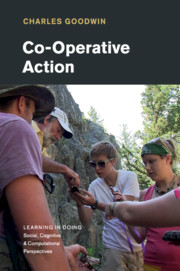Book contents
- Co-Operative Action
- Learning in Doing: Social, Cognitive and Computational Perspectives
- Co-Operative Action
- Copyright page
- Dedication
- Contents
- Figures
- Acknowledgments
- 1 What Is Co-Operative Action, and Why Is It Important?
- Part I Co-Operative Accumulative Action
- Part II Intertwined Semiosis
- Part III Embodied Interaction
- Part IV Co-Operative Action with Predecessors
- Part V Professional Vision, Transforming Sensory Experience into Types, and the Creation of Competent Inhabitants
- 20 The Emergence of Conventionalized Signs within the Natural World
- 21 Calibrating Experience and Knowledge by Touching the World Together
- 22 The Blackness of Black
- 23 Building Skilled, Knowing Actors and the Phenomenal Objects They Are Trusted to Know
- 24 Professional Vision
- 25 Conclusion
- References Cited
- Index
- Series page
25 - Conclusion
from Part V - Professional Vision, Transforming Sensory Experience into Types, and the Creation of Competent Inhabitants
Published online by Cambridge University Press: 03 November 2017
- Co-Operative Action
- Learning in Doing: Social, Cognitive and Computational Perspectives
- Co-Operative Action
- Copyright page
- Dedication
- Contents
- Figures
- Acknowledgments
- 1 What Is Co-Operative Action, and Why Is It Important?
- Part I Co-Operative Accumulative Action
- Part II Intertwined Semiosis
- Part III Embodied Interaction
- Part IV Co-Operative Action with Predecessors
- Part V Professional Vision, Transforming Sensory Experience into Types, and the Creation of Competent Inhabitants
- 20 The Emergence of Conventionalized Signs within the Natural World
- 21 Calibrating Experience and Knowledge by Touching the World Together
- 22 The Blackness of Black
- 23 Building Skilled, Knowing Actors and the Phenomenal Objects They Are Trusted to Know
- 24 Professional Vision
- 25 Conclusion
- References Cited
- Index
- Series page
Summary
This chapter draws together many of the themes developed separately in earlier chapters. Co-operative action – building new action by decomposing and reusing with transformation resources provided by earlier actors – underlies many phenomena typically examined in isolation from each other in separate disciplines: language, social organization, technology, our ability to share knowledge and experience by inhabiting each other’s actions, the distinctive character of human cooperation, cognition able to incorporate the contributions of others and path-dependent accumulation of diversity in language, culture, tools, and settings that creates pedagogy, or more generally, the task faced by each community of building new competent inhabitants. Rather than being constituted in a single domain, action is built by collecting together different kinds of materials into arrangements of mutual elaboration. Unfolding time as lived practice is central to this process on all scales, from within noun phrases to the historical diversification of societies. The task of accomplishing mutual intelligibility so as to rapidly build next action creates an environment that would promote the emergence of Peircean symbols, themselves forms of co-operative action, in the natural world. Co-operative action’s transformation of history, cognition, and sociality is central to the human adaptation.
* * *
- Type
- Chapter
- Information
- Co-Operative Action , pp. 429 - 478Publisher: Cambridge University PressPrint publication year: 2017

